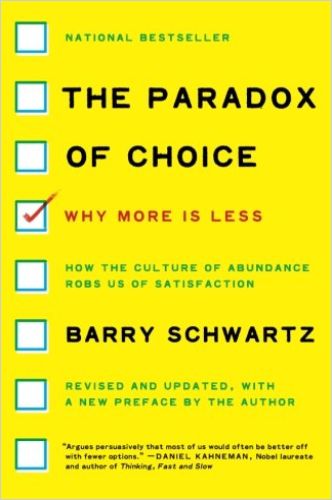

They also spend more time comparing their purchasing decisions with those of others. But maximizers exert enormous effort reading labels, checking out consumer magazines and trying new products. When satisficers find an item that meets their standards, they stop looking.

People who score highest on the test-the greatest maximizers-engage in more product comparisons than the lowest scorers, both before and after they make purchasing decisions, and they take longer to decide what to buy. We did not define a sharp cutoff to separate maximizers from satisficers, but in general, we think of individuals whose average scores are higher than 4 (the scale's midpoint) as maximizers and those whose scores are lower than the midpoint as satisficers. Then we had several thousand people rate themselves from 1 to 7 (from "completely disagree" to "completely agree") on such statements as "I never settle for second best." We also evaluated their sense of satisfaction with their decisions. Next, we composed a set of statements-the Maximization Scale-to diagnose people's propensity to maximize. We borrowed the term "satisficers" from the late Nobel Prize-winning psychologist and economist Herbert A. We began by making a distinction between "maximizers" (those who always aim to make the best possible choice) and "satisficers" (those who aim for "good enough," whether or not better selections might be out there). What could account for this degree of misery?Īlong with several colleagues, I have recently conducted research that offers insight into why many people end up unhappy rather than pleased when their options expand. Thus, it seems that as society grows wealthier and people become freer to do whatever they want, they get less happy. Of course, no single factor explains decreased well-being, but findings indicate that the explosion of choice plays an important role. In addition, more of us than ever are clinically depressed. As the gross domestic product more than doubled in the past 30 years, the proportion of the population describing itself as "very happy" declined by about 5 percent, or by some 14 million people. Lane of Yale University-reveal that increased choice and increased affluence have, in fact, been accompanied by decreased well-being in the U.S. Assessments of well-being by various social scientists-among them, David G. This evidence is consistent with large-scale social trends. Although some choice is undoubtedly better than none, more is not always better than less. Yet recent research strongly suggests that, psychologically, this assumption is wrong. To an extent, it is only logical to think that if some choice is good, more is better.

Americans today choose among more options in more parts of life than has ever been possible before.


 0 kommentar(er)
0 kommentar(er)
